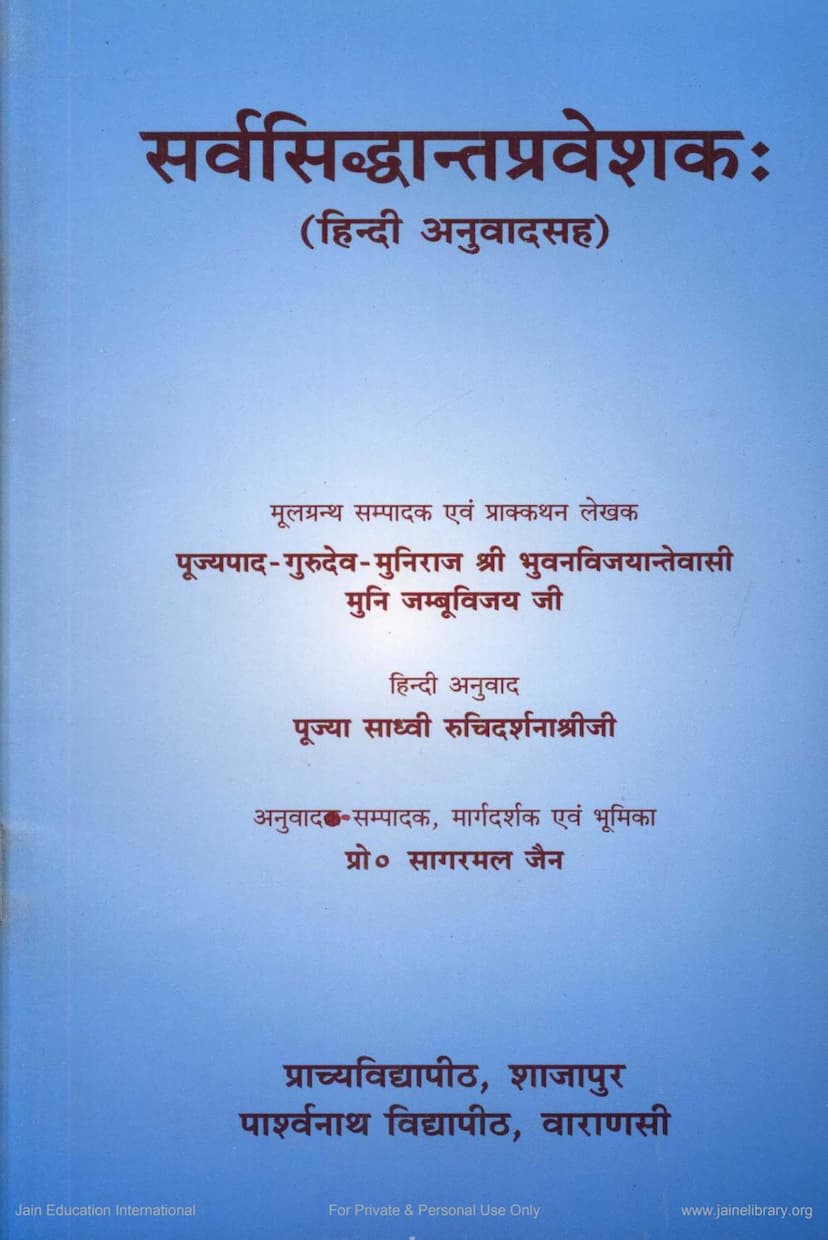Sarvsiddhantpraveshak
Added to library: September 2, 2025

Summary
Here's a comprehensive summary of the Jain text "Sarvsiddhantpraveshak" (सर्वसिद्धान्तप्रवेशक) based on the provided pages:
Book Title: Sarvsiddhantpraveshak (सर्वसिद्धान्तप्रवेशक) Author: Sagarmal Jain (Pro. Sagarmal Jain is the Hindi translator, editor, and author of the introduction. The original author is an unknown Jain Acharya.) Publisher: Prachya Vidyapith Shajapur, Parshvanatha Vidyapith, Varanasi Catalog Link: https://jainqq.org/explore/001804/1
Overview:
"Sarvsiddhantpraveshak" (The Entrance to All Principles) is a significant Jain work that aims to provide an exposition and comparative analysis of various Indian philosophical systems. It is presented with a Hindi translation and a detailed introduction (Bhumika) and preface (Prakkathan) by Professor Sagarmal Jain. The original text, found on palm-leaf manuscripts, is attributed to an unknown Jain Acharya who likely lived between the 8th and 12th centuries CE.
Key Aspects and Content:
-
Purpose and Scope:
- The book aims to introduce and explain the core principles of various Indian philosophical schools.
- It follows a tradition of "Darśana-Sangrahaka" (compilation of philosophies) texts that have a long history in both Jain and non-Jain traditions.
- The text critiques the tendency of some Darśana-Sangrahaka works to present their own philosophy as supreme and others as subordinate or flawed. Instead, it strives for a neutral, unbiased presentation of different viewpoints.
-
The Author and Context:
- The original author is an unknown Jain Muni, whose name is not mentioned in the palm-leaf manuscripts.
- Professor Sagarmal Jain's introduction highlights the significance of this work in the Jain tradition, comparing it to earlier works like Acharya Haribhadra Suri's "Ṣaḍdarśana-Samuccaya" (Collection of Six Philosophies).
- The text was edited by Muni Jambu Vijay ji and translated into Hindi by Sadhvi Ruchidarshana Shri ji.
-
Philosophical Systems Covered: "Sarvsiddhantpraveshak" systematically presents the views of the following seven major Indian philosophical systems:
- Nyaya: (Logic and Epistemology)
- Vaisheshika: (Atomism and Metaphysics)
- Jain Philosophy:
- Sankhya: (Theistic Dualism)
- Bauddha (Buddhist):
- Mimamsa: (Vedic Exegesis and Ritualism)
- Lokayata (Cārvāka): (Materialism)
-
Methodology and Style:
- The text presents a detailed analysis of the pramāṇas (means of valid knowledge) and prameyas (objects of knowledge) according to each school.
- It follows a prose style, unlike Haribhadra's "Ṣaḍdarśana-Samuccaya" which is in verse.
- The presentation is described as neither excessively detailed nor overly brief, making it accessible and informative for seekers of knowledge.
- The introduction by Prof. Sagarmal Jain emphasizes the Jain principle of Anekānta (non-absolutism) as the foundation for understanding different philosophies without bias. It advocates for the ability to accept the "satyānśa" (truthful element) in other perspectives.
-
Comparison with Other Works:
- The introduction draws parallels with and contrasts "Sarvsiddhantpraveshak" with other Darśana-Sangrahaka works like:
- Haribhadra Suri's Ṣaḍdarśana-Samuccaya: Praised for its unbiased and comprehensive presentation, serving as a precursor and influence.
- Sarvasiddhāntasangraha & Sarvadarśana Sangraha (attributed to Shankar and Madhavacharya respectively): These are noted for their "khandana-prak" (refutational) style, where they establish their own Vedanta philosophy by critiquing others. "Sarvsiddhantpraveshak" (like Haribhadra's work) is distinguished by its neutral approach.
- Other Jain works: Mention is made of Siddhasena Divakara's "Dvātriṁśikā" and Jinvallabha Suri's "Vivekavilasa," noting their often refutational intent or limited scope compared to "Sarvsiddhantpraveshak."
- The introduction draws parallels with and contrasts "Sarvsiddhantpraveshak" with other Darśana-Sangrahaka works like:
-
Core Jain Concepts Highlighted:
- The book's preface and introduction prominently discuss the Jain principle of Anekānta (non-absolutism) as the key to understanding and appreciating diverse philosophical viewpoints.
- The text implicitly supports the Jain goal of Moksha (liberation) and the importance of discerning the correct path to it through balanced study.
- The seven tattvas (realities) of Jainism—Jiva, Ajiva, Asrava, Bandha, Samvara, Nirjara, and Moksha—are briefly mentioned as the core of Jain doctrine.
-
Contribution: "Sarvsiddhantpraveshak" serves as a valuable resource for understanding the foundational principles of various Indian philosophical traditions from a Jain perspective, emphasizing neutrality and intellectual openness. It fills a gap by offering a systematic, prose-based exposition of these systems within the Jain literary tradition.
In essence, "Sarvsiddhantpraveshak" is a Jain compendium of Indian philosophies, notable for its balanced and systematic approach, its adherence to the spirit of Anekānta, and its contribution to comparative religious and philosophical studies.